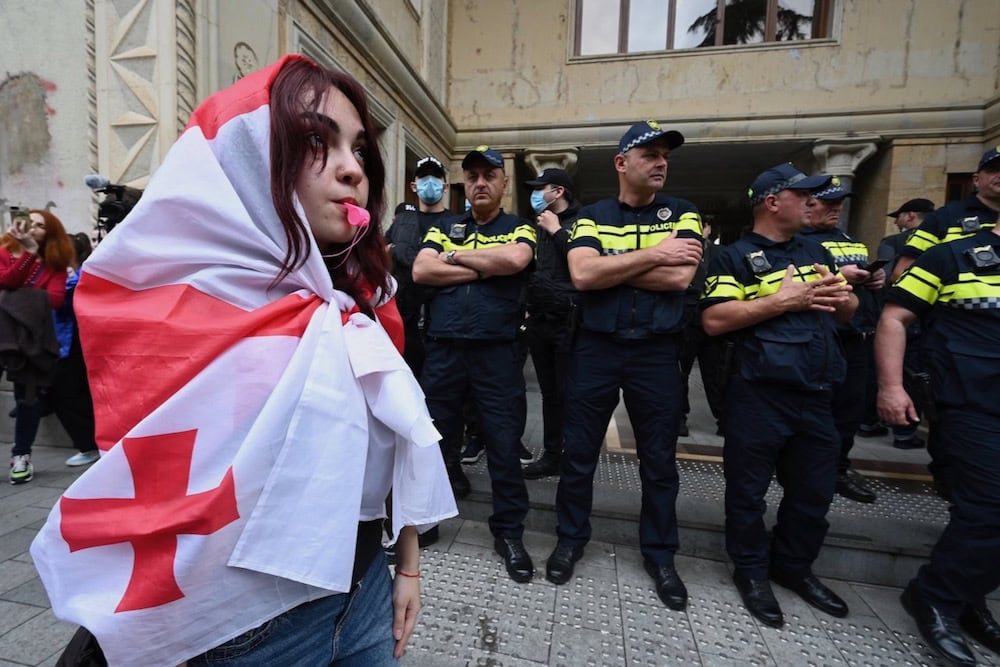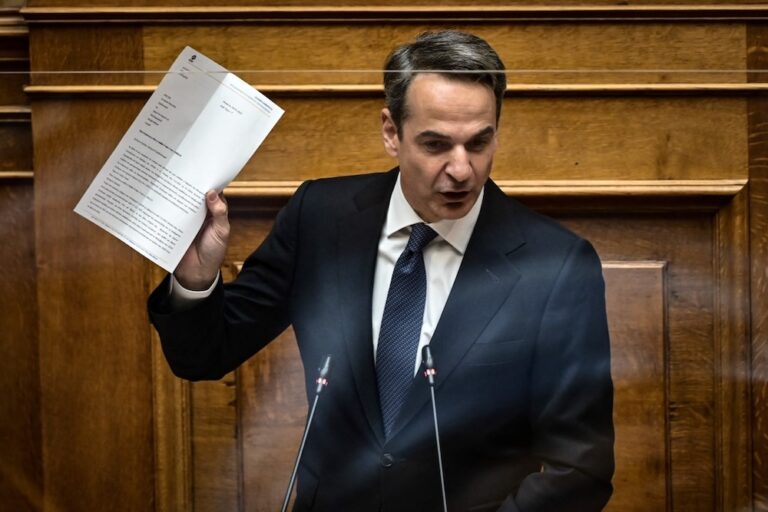May 2024 in Europe and Central Asia: A free expression round-up produced by IFEX's Regional Editor Cathal Sheerin, based on IFEX member reports and news from the region.
“Foreign agents” legislation in Georgia and Turkey; mass sentencing of Kurdish politicians; solidarity with Belarus’s political prisoners; Russia’s crimes against media in Ukraine; Julian Assange granted right to appeal extradition.
Georgian nightmare
On 14 May, despite huge protests in the streets of Tbilisi, Georgia’s parliament adopted the ruling Georgian Dream Party’s Law On Transparency Of Foreign Influence. Critics have dubbed this legislation the “foreign agents” law or the “Russian law” because of its similarity to legislation in Russia.
Soon after the law was adopted, it was vetoed by Georgia’s president, Salome Zurabishvili, who described it as an attempt to “crush civil society”. On 28 May, however, her veto was overturned by parliament, where the Georgian Dream Party has a significant majority.
Under the new law, civil society organisations (CSOs) that receive 20% or more of their funding from abroad will have to register as an “organisation pursuing the interests of a foreign power” or face a large fine. They will be subject to onerous reporting requirements and will also be more vulnerable to investigation by the authorities.
The Committee to Protect Journalists (CPJ) warned that the government would use the law “to smear and suppress critical voices” ahead of parliamentary elections in October.
Kety Abashidze, in an article for Index on Censorship, examines the law as “part of a larger pattern of assault against a broad range of human rights in Georgia”. She reports that 150 Georgian CSOs have “vowed not to register”.
Arzu Geybullayeva, writing for the Global Voices website, describes the excessive force used by the authorities against those protesting against the legislation. The weeks leading up to 14 May saw mass arrests and police used rubber bullets, tear gas and water cannons against protesters. There were also reports of government critics and their families being attacked.
Several members of the press were threatened for covering the protests; others were assaulted by the police.
Before the adoption of the law, IFEX joined 17 CSOs in calling on Prime Minister Kobakhidze to withdraw the legislation, guarantee the safety of journalists covering the protests, and investigate incidents where the press had been targeted.
The law and the authorities’ crackdown on the protesters drew international condemnation. The UN High Commissioner for Human Rights called for “transparent investigations into all allegations of ill-treatment during or after protests or in detention” and for the law to be withdrawn.
The Council of Europe’s Venice Commission urged Georgia to repeal the legislation.
Chillingly, in early May, the ruling party said that it would introduce a database to register individuals who allegedly carried out or supported “violence, threats, and blackmail” during the protests.
The Law On Transparency Of Foreign Influence is not the only “Russian law” in Georgia. The ruling party, which has a history of stoking homophobia, also introduced a “gay propaganda” law in March.
Turkey
“Agents of influence” to be criminalised?
The ruling Justice and Development Party (AKP) has proposed an amendment to the Turkish Penal Code that will criminalise so-called “agents of influence”. It is part of a package of anti-espionage legislation dubbed the “9th Judicial Package” and it appears to be aimed at journalists, civil society groups and social media users whose work or published opinions could be interpreted by the authorities as going against Turkey’s interests. As Nordic Monitor summarises:
“The amendment aims to identify individuals who influence public opinion by disseminating propaganda against Turkey, although appearing to favour Turkey’s interests. Additionally, people propagating anti-Turkey views via social media will also be classified as agents of influence under the new regulation. These individuals are defined as those who disrupt the country’s economic, social or public order.”
Those convicted under the legislation would potentially face lengthy prison sentences. In its analysis of the law, Expression Interrupted (a project of the P24 Platform for Independent Journalism) warns that it could trigger a “witch hunt”.
Reporters Without Borders (RSF) called on the government to abandon the draft law, saying:
“If Parliament adopts this broadly and vaguely worded legislation, any journalist who annoys the government could easily be targeted as an agent of influence who supposedly supported the positions or interests of a foreign country.”
According to Bianet, the package of amendments is expected to be presented to parliament on 1 July, before parliament goes into recess.
Ongoing crackdown on Kurdish rights
On 16 May, the Ankara 22nd Heavy Penal Court sentenced 24 Kurdish politicians to between nine and 42 years in prison on what Human Rights Watch (HRW) described as “bogus charges” following a “manifestly political and unjust trial”. Among those sentenced was the former co-chair of the pro-Kurdish Peoples’ Democratic Party (HDP) and honorary PEN member Selahattin Demirtaş, who received a 42-year sentence. He was convicted on charges of “aiding in undermining the unity and integrity of the state”, “incitement to commit a crime” and “making terrorist propaganda”.
Demirtaş and his co-defendants were on trial over their alleged involvement in deadly protests that took place in Turkey in 2014; these followed an attack by the Islamic State on the Syrian Kurdish town of Kobani.
Demirtaş has been behind bars since 2016, when he was arrested on spurious terrorism-related charges. In 2018, he was convicted of “terrorist propaganda”; in 2021, he was convicted of “insulting the president”. In 2018 and 2020, the European Court of Human Rights ruled that Demirtaş should be immediately released: Turkey has refused to abide by these rulings.
Solidarity with political prisoners in Belarus
On 21 May, rights groups marked the International Day of Solidarity with Political Prisoners in Belarus. The theme of this year was the right to health and medical care in detention. According to Viasna, six political prisoners have died behind bars in the last three years due to untreated medical conditions or substandard medical care. The organisation has identified another 254 prisoners who are at risk due to health-related issues.
On 17 May, police raided the Minsk apartment of Barys Haretski, deputy chairman of IFEX member the Belarusian Association of Journalists (BAJ). Haretski and other BAJ leaders have been living in exile since 2021. BAJ reports that a case has been opened against Haretski, but the details are as yet unknown. The day before Haretski’s property was raided, authorities seized the apartment of exiled journalist Dzmitry Kazakevich.
Earlier in May, BAJ and the Union of Lithuanian Journalists marked World Press Freedom Day by organising a solidarity event in Lukiškės Prison, Vilnius. The event highlighted the plight of over 30 journalists who are currently behind bars in Belarus.
Media Freedom Rapid Response partners called on the Serbian authorities to release Belarusian journalist and activist Andrey Gniot, who has been behind bars in Serbia since his arrest in October 2023. He was detained on politically-motivated charges of tax evasion, formulated by the authorities in Minsk. The Serbian courts are considering a request to deport Gniot to Belarus.
In brief
On 20 May, the UK High Court granted Julian Assange the right to appeal his extradition to the US. The decision was made on grounds that – due to Assange’s Australian citizenship – he might be denied free speech protections afforded by the First Amendment in the US.
Russia’s forces have committed at least 599 crimes against the media and journalists in Ukraine since President Putin launched his invasion in February 2022, according to a report by the Institute of Mass Information. These crimes include: killings, woundings and abductions of journalists; bombings of offices and TV broadcast towers; cyberattacks and death threats. Since the start of the war, 234 media outlets have been forced to close down.
Israel’s war on Gaza continues to have repercussions for human rights in Europe – especially for the rights to free expression, assembly and movement of pro-Palestinian voices. In early May, British-Palestinian war surgeon and Rector of Glasgow University, Ghassan Abu Sittah, was denied entry to France and the Netherlands due to a Schengen-area travel ban imposed by Germany. He had been due to speak about what he witnessed treating the victims of the war in Gaza. The previous month, Germany had deported Abu Sittah to prevent him from addressing the Palestine Congress in Berlin, an event that the police eventually raided and shut down. However, on 14 May, it was announced that the travel ban had been successfully challenged, in what Abu Sittah’s lawyer described as “a significant turning point in challenging the hostile environment that Palestinian human rights advocates like Professor Ghassan have faced in recent months”.



